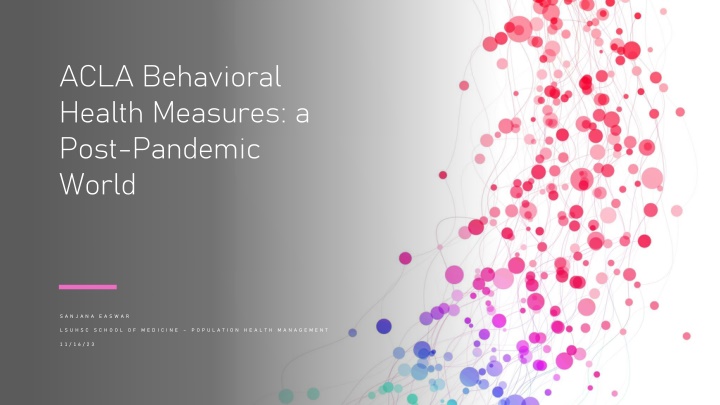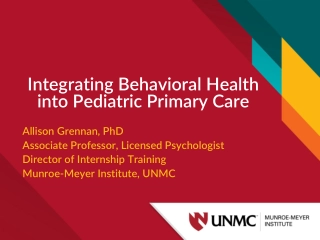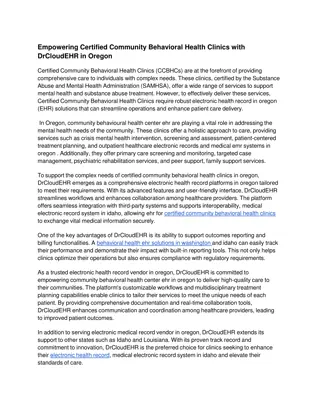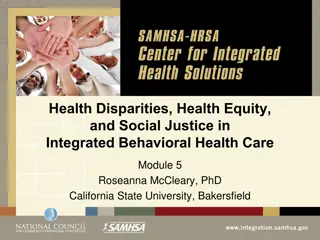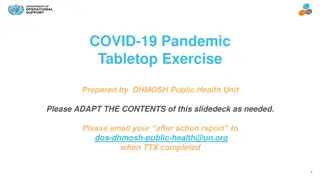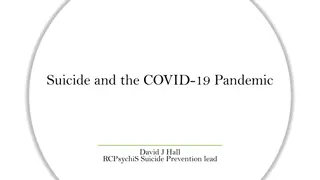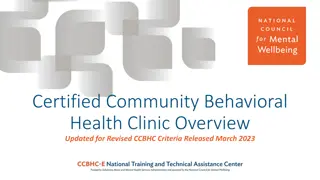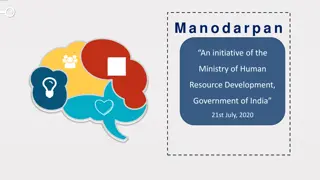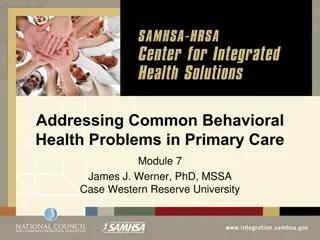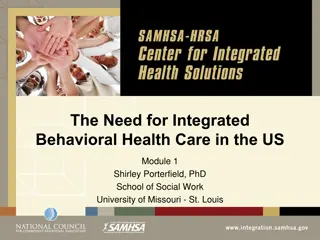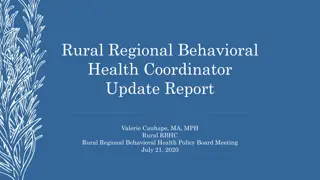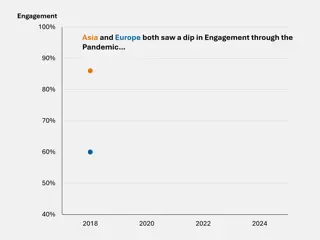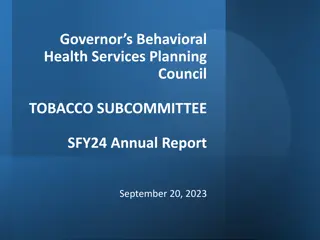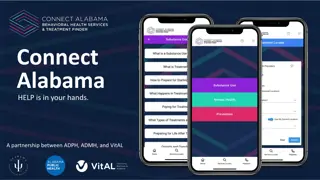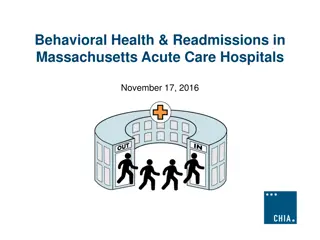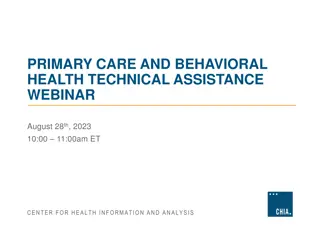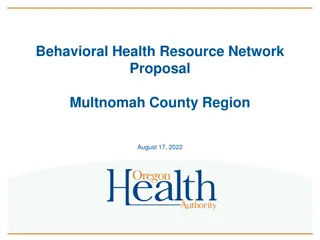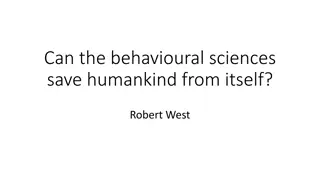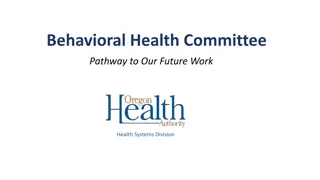Behavioral Health Measures in a Post-Pandemic World Overview
Declaration of the pandemic by WHO led to an uptick in mental health issues, affecting vulnerable populations. Explore current and future interventions for improved population health management.
Download Presentation

Please find below an Image/Link to download the presentation.
The content on the website is provided AS IS for your information and personal use only. It may not be sold, licensed, or shared on other websites without obtaining consent from the author.If you encounter any issues during the download, it is possible that the publisher has removed the file from their server.
You are allowed to download the files provided on this website for personal or commercial use, subject to the condition that they are used lawfully. All files are the property of their respective owners.
The content on the website is provided AS IS for your information and personal use only. It may not be sold, licensed, or shared on other websites without obtaining consent from the author.
E N D
Presentation Transcript
ACLA Behavioral Health Measures: a Post-Pandemic World S A N J A N A E A S W A R S A N J A N A E A S W A R L S U H S C S C H O O L O F M E D I C I N E L S U H S C S C H O O L O F M E D I C I N E P O P U L A T I O N H E A L T H M A N A G E M E N T P O P U L A T I O N H E A L T H M A N A G E M E N T 1 1 / 1 6 / 2 3 1 1 / 1 6 / 2 3
Overview Background Definitions Findings and pertinent data Current interventions Future interventions
Background Declaration of the pandemic by the WHO: 3/11/2020 Uptick of symptoms of anxiety and depressive disorder Increased burden of mental health issues post-COVID: New-onset mental health issues Relapse of pre-existing mental illnesses Suicidal behaviors Vulnerable populations: children and adolescents, elderly, homeless persons, healthcare workers, individuals with prior psychiatric illnesses, pregnant women, migrants/refugees, LGBTQ+ individuals, racial and ethnic minorities
Behavioral Focus Measures FUH: Follow-up after hospitalization for mental illness (30 days after discharge) The percentage of discharges for members 6 years of age and older illness or intentional self-harm diagnoses and who had a follow-up visit with a mental health provider. 6 years of age and older who were hospitalized for treatment of selected mental Total: 6+ year old individuals who were hospitalized and discharged with a mental illness diagnosis or episode of self-harm Factors focused on: Age Gender Member region Race Ethnicity Primary diagnosis Data from 2021 and 2022
2021 2022 M M 41% Findings Age and Gender of Follow-Ups 42% F F 59% 58% Age 3500 3000 2500 2000 1500 1000 500 0 6 to 12 years 13 to 17 years 18 to 29 years 30 to 39 years 40 to 49 years 50 to 59 years 60 to 69 years 2021 2022
Findings Member Regions of Follow-Ups 2021 2021 2022 2022 Region 1 689 732 Region 2 1073 1650 Region 3 773 1594 Region 4 640 671 Region 5 454 721 Region 6 611 977 Region 7 1433 1779 Region 8 811 1534 Region 9 598 751 *89 members did not identify a region in 2022
Findings Race & Ethnicity of Follow-Ups Race 6000 5000 4000 3000 2000 1000 0 White Black or African American American Indian or Alaska Native Asian Native Hawaiian or other Pacific Islander Two or more races Unknown race 2021 2022 Ethnicity 10000 8000 6000 4000 2000 0 Hispanic or Latino Not Hispanic or Latino Unknown
Findings Primary Diagnoses of Follow-Ups Postpartum depression Other mood/affective disorders Disruptive mood dysregulation disorder Dysthymic disorder Major Depressive Disorder with psychosis Major Depressive Disorder, recurrent, in partial or full remission Major Depressive Disorder, single episode, in partial or full remission Bipolar Disorder in partial or full remission Bipolar disorder/episodes with psychotic features Bipolar disorder/episodes without psychotic features Schizoaffective disorder Primary psychosis 0 500 1000 1500 2000 2500 3000 3500 2021 2022
Current interventions Discharge Plans Ensure member has a discharge plan (current medication list, appointment with aftercare provider(s) at a time/location convenient to member/based on member preferences, and interventions to address barriers to care (e.g., transportation, language etc.). Ensure member understands discharge plan using teach-back methods to address health literacy. Educate members on purpose and importance of aftercare appointments, and how to reschedule appointments if the scheduled time does not work. Provide follow-up to member within 72 hours following discharge from hospital or emergency department to identify and address any unmet needs. Provide ongoing MCO case management to members with special health care needs. Warm transfer from MCO to high volume provider to complete follow-up, within 7 days of discharge Follow-Up appointment reminder call 1-2 days prior to the scheduled appointment by MCO Case Managers. Assist member with transportation as needed. Behavioral Health Texting Campaign to members recently discharged from emergency department or inpatient hospital with a diagnosis of mental illness or intentional self-harm October 2023: Offer member reward for FUM members discharged from emergency departments who complete 30-day follow-up appointments with the appropriate provider type. In January 2024: Pilot program with a high-volume hospital to offer outpatient/telehealth bridge follow-up appointments following inpatient discharge
Summary/Additional Recommendations Continue to formulate clear discharge plans Continue text reminders for following up Social media campaigns Telepsychiatry Alternative outpatient services partial hospitalizations, community mental health centers (ACT teams)
Resources file://Amerihealth_LA2023_PIP-Val_BH_TOC_Quarter 3 Submission.doc https://gpsych.bmj.com/content/34/1/e100424 https://www.tc.columbia.edu/articles/2023/april/need-to-know-about-the-pandemics- lasting-effects-on-youth-mental-health-/ https://www.kff.org/mental-health/issue-brief/the-implications-of-covid-19-for-mental- health-and-substance-use/ https://www.thecommunityguide.org/media/pdf/healthcomm-AJPM-recs-campaigns.pdf https://www.apa.org/health/behavioral-integration-fact-sheet
